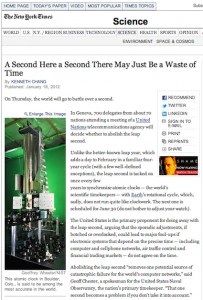The last couple of days have seen a number of articles on the “leap second,” this otherwise unremarkable second that we agree to insert every now and then to keep atomic clocks in sync with the rotation of the earth. The decision yesterday to postpone making a decision sounds a lot like early modern efforts to reform the calendar. Then they were concerned about keeping the calendar in sync with planetary motions—in particular, they worried that the spring equinox was drifting too far from the established date.

For more than 300 years astronomers, mathematicians, and astrologers argued about how best to fix the problem. It wasn’t until 1582 that Pope Gregory issued a papal bull establishing a new, reformed, and more accurate calendar. Still, it took some countries centuries to adopt this new calendar.
For a longer version of this, see my post The Politics of Calendar Reform.
One reply on “The Politics of Time and Date”
[…] of day and the day of the year have been contested for centuries, whether we are worried about a leap second or moving the date of Easter. In honor of all the people who get worked up over this issue, I offer these two early-modern […]